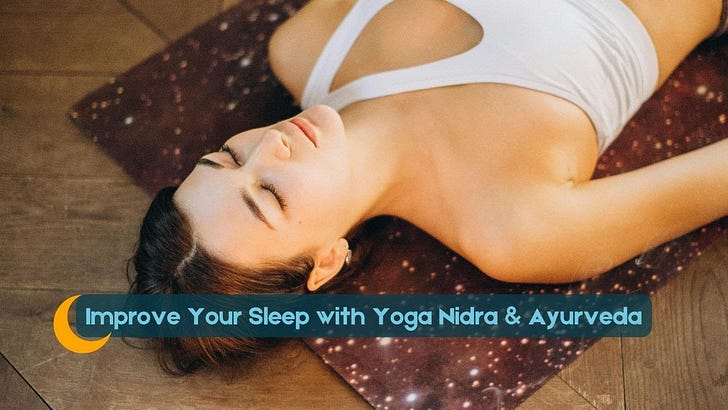How to Quickly Improve Your Sleep with Yoga Nidra & Ayurveda
Relax deeply and sleep better tonight with Yoga Nidra
If you spend sleepless nights, tossing and turning without finding sleep, or if you wake up in the middle of the night and can’t fall back asleep, this video is for you!
Because today, I’m going to explain how Yoga Nidra can transform your nights and give you deep, restorative sleep.
So first, what’s Yoga Nidra?
Yoga Nidra means “Yogic sleep.” It’s a method of deep relaxation where the body rests as if it was asleep, but the mind remains conscious and awake.
In classical meditation, you stay in a waking state, but Yoga Nidra takes you beyond the dream state, into deep sleep… while keeping your awareness alert.
Yoga Nidra allows us to transcend the three states of consciousness we all know (wakefulness, sleep, and dreaming), and helps us explore the fourth state-turiya-a state of effortless awareness or deep conscious sleep.
Lack of Sleep and Its Consequences
An adult needs 7 to 9 hours of sleep per day: for repair, protein production, etc.
But the world average is just 6.7 hours.
Lack of sleep has serious health consequences: it increases the risk of chronic diseases-obviously, there’s lack of energy, memory problems, irritability and mood swings… But also obesity, diabetes, high blood pressure, heart disease, strokes, depression, decreased libido, hormonal imbalance, and accelerated aging.
How Yoga Nidra Supports Sleep?
Although not originally designed for sleep, Yoga Nidra, which is extremely relaxing, helps manage chronic sleep deprivation and insomnia because it soothes stress, anxiety, and accumulated tension from the day.
According to Swami Satyananda Saraswati, a 30-minute session of Yoga Nidra is equivalent to 3 or 4 hours of restorative sleep!
You can use it:
As a sleep-inducing practice
To fall back asleep after waking up at night
As a restorative practice to offset the effects of sleep deprivation, insomnia, or to relieve symptoms of chronic fatigue related to stress
How to Prepare for Bedtime?
No stimulants after noon.
Last meal 2-3 hours before bed.
No screens for at least 1 hour before bed.
Dim the bedroom lights, keep the temperature cool.
Choose one guided Yoga Nidra recording. I have several free practices online (here and here), or you can join my New Moon Yoga Nidra circles.
Over time, your brain will associate this particular practice with falling asleep, making it easier to enjoy deep, restorative sleep.
Lie down in your bed.
Let yourself be guided: simply follow my voice, without trying to control anything.
To Conclude
So Yoga Nidra is much more than simple relaxation: it’s a powerful tool that helps you regain quality sleep, reduce anxiety, and recharge your energy.
So try it tonight, and share your experience in the comments!
Good night and see you soon!
May your dreams bring you balance & harmony ✨
Claire | Mosqoy Ushay



